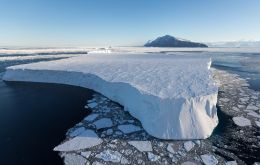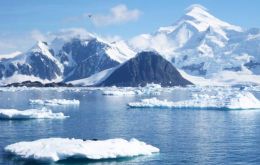MercoPress. South Atlantic News Agency
Tag: Amundsen Sea
-
Thursday, April 7th 2022 - 09:34 UTC
New link between greenhouse gases and sea-level rise, BAS scientists

Advanced ocean modeling techniques reveal how greenhouse gas emissions contribute to warmer oceans and the resulting melting of the West Antarctic Ice Sheet. A new study by scientists Kaitlin Naughten and Paul Holland from British Antarctic Survey (BAS) provides the first evidence that rising greenhouse gases have a long-term warming effect on the Amundsen Sea in West Antarctica.
-
Thursday, April 2nd 2020 - 07:55 UTC
Antarctica some 90 million years ago was a temperate, swampy rainforest

Antarctica is now a harsh land of ice and snow but has not always been that way. Earth's southernmost continent long ago was home to temperate, swampy rainforests teeming with life, scientists said on Wednesday based on pristinely preserved forest soil they retrieved by drilling under the seafloor off Antarctica's coast.
-
Tuesday, May 20th 2014 - 08:19 UTC
Antarctica ice sheet loss has doubled since 2010, shows CryoSat satellite

The Antarctic ice sheet has lost ice twice as quickly in the past three years as when it was last surveyed between 2005 and 2010, say scientists. Results from the CryoSat-2 satellite mission, published Monday in the journal Geophysical Research Letters, say the largest ice sheet on Earth is now losing 159 billion tons of ice each year.
-
Wednesday, May 14th 2014 - 00:15 UTC
West Antarctica glaciers' melting 'have passed the point of no return', says NASA study

A new study by researchers at NASA and the University of California, Irvine, finds a rapidly melting section of the West Antarctic Ice Sheet appears to be in an irreversible state of decline, with nothing to stop the glaciers in this area from melting into the sea.
-
Monday, February 28th 2011 - 00:22 UTC
NZ abandons search for Norwegian yacht with three men missing in Antarctic waters

A week-long search for a Norwegian yacht missing in Antarctic waters with three men aboard has been abandoned, New Zealand's Rescue Co-ordination Centre announced Monday.
-
Tuesday, December 14th 2010 - 17:12 UTC
US/Swedish expedition to explore Amundsen Sea ecology and potential ‘polynyas’

In a complex example of “science diplomacy,” teams of U.S. and Swedish scientists are sailing this month aboard two research vessels to study the ecology of the Amundsen Sea, one of the least-explored and most productive bodies in Antarctic waters, and to gauge the potential effects of a changing climate on the Southern Ocean.
